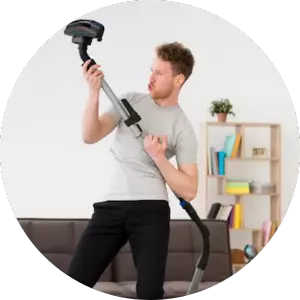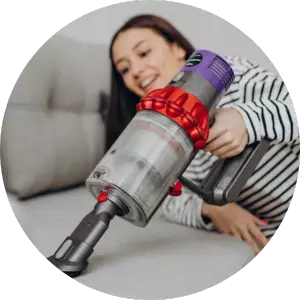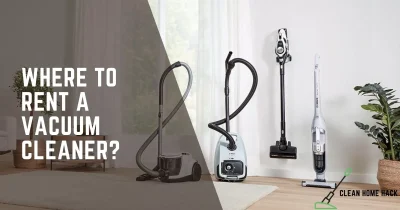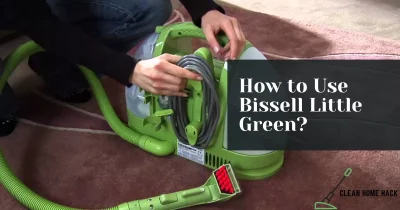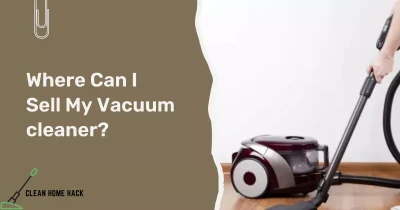How to Quiet a Vacuum Cleaner?
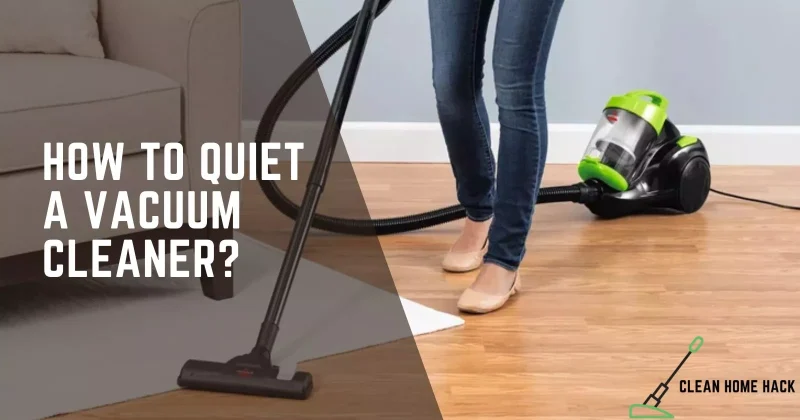
 The Short Answer is: The Short Answer is: |
| Here are some easy tips to make your vacuum cleaner quieter: 1. Cover the air outlet with a towel or cloth to muffle the noise. 2. Clean the filter to ensure proper airflow and reduce noise caused by a clogged filter. 3. Check for any clogs in the vacuum cleaner and remove them. 4. Tighten the belt if it is loose, as a loose belt can cause the vacuum cleaner to make more noise. 5. Fix any holes or leaks in the vacuum cleaner to reduce noise. |
Vacuum cleaners are essential household appliances that help keep our homes clean and free of dust and debris. However, the noise generated by vacuum cleaners can be a nuisance, especially if you live in an apartment or have young children or pets.
Fortunately, there are ways to quiet a vacuum cleaner and make it less disruptive. In this article, we will explore some of the best ways to reduce vacuum cleaner noise and highlight some of the quietest vacuum cleaners available on the market today.
Whether you’re looking to upgrade your current vacuum cleaner or simply want to make it less noisy, this article will provide you with the information you need to achieve a quieter, more peaceful home environment. So let’s dive in and find out: How to Quiet a Vacuum Cleaner?
Table of Contents
Types of Vacuum Cleaners
There are several types of vacuum cleaners available in the market, each with its own set of features and benefits5. When it comes to noise levels, most vacuum cleaners fall in the range of 60 dB to 80 dB. Here are some of the types of vacuum cleaners and their noise levels:
- Upright Vacuums: Upright vacuums are great for cleaning carpets quickly and thoroughly, but they tend to be loud2. The noise level of upright vacuums is typically around 70 dB.
- Canister Vacuums: Canister vacuums are a good choice if you have stairs in your home because you can hold the hose in one hand and the body of the vacuum in the other. They typically offer powerful suction, which means they excel when you’re using tools. The noise level of canister vacuums is around 70 dB.
- Stick Vacuums: Stick vacuums tend to be quieter than upright and canister vacuums, and their relatively compact size makes them easy to store. The noise level of stick vacuums is around 60 dB.
- Handheld Vacuums: Handheld vacuums are great for cleaning small messes and hard-to-reach areas. They tend to be quieter than other types of vacuums, with a noise level of around 65 dB.
- Robotic Vacuums: Robotic vacuums are designed to clean your floors automatically, without any input from you. They tend to be quieter than other types of vacuums, with a noise level of around 55 dB.
It’s important to note that noise levels can vary depending on the brand and model of the vacuum cleaner. When shopping for a vacuum cleaner, be sure to check the noise level to ensure that it meets your needs.
Identifying the Noise Sources in Your Vacuum Cleaner
Identifying the noise sources in your vacuum cleaner is an important step in understanding and potentially reducing the noise it produces. Here are some key points to consider:
- Perform a noise audit: The first step in noise control is to perform a noise audit of your vacuum cleaner. This involves assessing the unit and identifying the noise sources and their transmission paths.
- Sound pressure measurement: Measurement techniques, such as using a sound pressure-velocity (PU) probe, can be applied to diagnose the location of the noise source in the vacuum cleaner.
- Airborne and structure-borne noise: Noise emitted by a vacuum cleaner suction unit consists of both airborne and structure-borne noise. The airborne noise is mainly generated by the turbo blower, while structure-borne noise is caused by vibrations transmitted through the vacuum cleaner’s structure.
- Geometry and operating conditions: The contribution of each noise source to the total noise level depends on the geometry of the suction unit and the operating conditions of the vacuum cleaner.
By identifying the specific noise sources in your vacuum cleaner, you can take targeted steps to reduce or mitigate the noise. This may involve addressing issues with the turbo blower, reducing vibrations, or implementing sound insulation measures.
Importance of Quieting Your Vacuum Cleaner
Quieting your vacuum cleaner is important for several reasons. Here are some of them:
- Reduced noise pollution: Vacuum cleaners can be very loud, and prolonged exposure to loud noise can cause hearing damage and other health problems. Quieter vacuum cleaners can help reduce noise pollution in your home and protect your hearing.
- Better air quality: Vacuums by their nature cause dust to become airborne, by exhausting air that is not completely filtered. This can cause health problems since the operator ends up inhaling respirable dust, which is also redeposited into the area being cleaned. Quieter vacuum cleaners can help reduce the amount of dust and allergens that are released into the air, improving air quality and making your home a healthier place to live.
- Less disturbance: Quieter vacuum cleaners are less likely to disturb other people in your home or your neighbors if you live in an apartment or a shared building. This can help you maintain good relationships with those around you.
- Similar benefits at a similar price: Quieter vacuum cleaners are often priced similarly to their louder counterparts, so you can enjoy the benefits of owning a quieter vacuum cleaner without breaking the bank.
Overall, quiet vacuum cleaners can help make your home a more pleasant and healthy place to live.
Precautions Before Attempting to Reduce Noise
Before attempting to reduce vacuum cleaner noise, it is important to take certain precautions to ensure safety and effectiveness. Here are some precautions you should consider:
- Clean the filter and motor: Pop the top of the vacuum cleaner and take out the filter. Cleaning the filter and motor can help improve the efficiency of the vacuum cleaner and reduce noise.
- Keep pets and children away: It is important to keep pets and children away from the vacuum cleaner while it is in use to prevent injuries or accidents, such as electrocution.
- Beware of loops and kinks: Make sure to be aware of any loops or kinks in the vacuum cleaner’s cord. These can cause the cord to become damaged or tangled, potentially leading to electrical hazards.
- Wear protective gear: Consider wearing protective gear such as a face mask and goggles while vacuuming. A face mask can help protect against dust allergens, while goggles can prevent dust or dirt particles from entering your eyes.
- Use ear protectors: If the noise from the vacuum cleaner is bothersome, consider using ear protectors to reduce the excess noise.
- Avoid picking up large or sharp objects: It is important to avoid trying to pick up large or sharp objects with the vacuum cleaner, as this can cause damage to the machine and potentially lead to accidents.
- Keep away from flammable materials: Like any electric appliance, it is important to keep the vacuum cleaner far away from flammable or combustible materials to reduce the risk of fire hazards.
By following these precautions, you can ensure a safer and more efficient vacuuming experience while also reducing the noise produced by the vacuum cleaner.
How to Make a Vacuum Quieter: A Step-by-Step Guide
Here is a step-by-step guide on how to quiet a vacuum cleaner:
- Detangle the brush: Use scissors to cut any strong strands of debris that may be tangled in the brush.
- Lubricate the brush: Apply lubricant to the brush to reduce friction and noise.
- Use a muffler attachment: Attach a muffler to the vacuum cleaner to reduce noise. This can help dampen the sound produced by the motor.
- Cover the air outlet: Take a piece of cloth and make tiny holes in it. Cover the air outlet of the vacuum cleaner with the cloth and tie it to the rim. This allows some air to pass through while reducing noise.
- Clean the vacuum cleaner: Regularly clean your vacuum cleaner to ensure optimal performance and reduce noise.
By following these steps, you can make your vacuum cleaner quieter and maintain its performance.
Focus on the Motor: Noise Reduction Techniques
Vacuum cleaners can be noisy, but the level of noise is mostly determined by the type of motor that the vacuum has. The suction motor is one of the most important parts of a vacuum cleaner, as it takes the electrical power from the power source and converts it into mechanical power in the form of suction with airflow.
Here are some tips on how to focus on the motor to quiet a vacuum cleaner:
- Choose a vacuum with a weaker motor: Vacuums with a weaker motor are usually quieter than those with a stronger motor.
- Consider a canister vacuum: Canister vacuums are generally less noisy than upright vacuums.
- Check the decibel rating: The amount of noise a vacuum makes while operating is rated in decibels (dB).
- Extremely quiet vacuum cleaners can operate at decibel levels in the mid-sixties while cleaners in the 70-77 dB range are still very quiet.
- Maintain the motor: Regular maintenance of the motor can help reduce noise. This includes cleaning the motor and replacing the filters.
- Consider a vacuum with a universal motor: The most common type of motor used in vacuum cleaners is the universal motor, which can operate on both AC and DC power.
By focusing on the motor, you can reduce the noise level of your vacuum cleaner and make cleaning a more pleasant experience.
Addressing Airflow and Suction Noise
To address airflow and suction noise in order to quiet a vacuum cleaner, you can take the following steps:
- Check the belt: A loose belt can cause the vacuum motor to make more noise. Ensure that the belt is tight and properly aligned.
- Inspect the airflow: The airflow within the vacuum cleaner can contribute to the noise level. Consider altering the airflow by using soundproofing accessories or mufflers designed to reduce noise levels.
- Clean or replace filters: Clogged or dirty filters can restrict airflow and cause the vacuum cleaner to work harder, resulting in increased noise. Regularly clean or replace the filters to maintain optimal airflow.
- Inspect the hose and attachments: Check for any blockages or obstructions in the hose and attachments. Clearing these blockages can improve airflow and reduce noise.
- Consider the vacuum cleaner specifications: When purchasing a vacuum cleaner, pay attention to the airflow rating, measured in cubic feet per minute (CFM). A higher airflow rating generally indicates better cleaning ability and potentially quieter operation.
- Follow proper maintenance procedures: Regularly clean and maintain your vacuum cleaner according to the manufacturer’s instructions. This includes emptying the dust bag or container, cleaning the brush roll, and lubricating any moving parts. Proper maintenance can help ensure optimal airflow and reduce noise.
Remember that while these steps can help reduce noise, it may not be possible to completely eliminate all noise from a vacuum cleaner. Some noise is inherent to the operation of the motor and airflow.
Regular Maintenance for a Quieter Vacuum Cleaner
Regular maintenance is crucial for keeping your vacuum cleaner operating quietly. Here are some tips for regular maintenance to help reduce noise from your vacuum cleaner:
- Check the filter often: A dirty filter can cause your vacuum cleaner to work harder, which can increase the noise level. Check the filter often and clean or replace it when needed.
- Clean the brush roll: The brush roll can become clogged with hair and debris, which can cause the vacuum cleaner to make more noise. Clean the brush roll regularly to keep it working smoothly.
- Empty the dustbin: A full dustbin can also cause your vacuum cleaner to work harder and make more noise. Empty the dustbin after each use.
- Check for clogs: Clogs in the hose or other parts of the vacuum cleaner can cause it to work harder and make more noise. Check for clogs regularly and clear them out.
- Replace worn parts: If any parts of your vacuum cleaner are worn or damaged, they can cause it to make more noise. Replace any worn or damaged parts as soon as possible.
By following these regular maintenance tips, you can help keep your vacuum cleaner operating quietly and efficiently.
Quietest Vacuum Cleaners Available on the Market
When it comes to quiet vacuum cleaners, there are several options available on the market. Here are some of the quietest vacuum cleaners according to reviews and tests:
- Hoover Commercial HushTone 13: This vacuum is known for its supreme quietness, with a noise level of 69 dB. It also offers top-quality suction power.
- Bissell Zing Bagless Canister Vacuum: Falling on the less expensive side, this vacuum is praised for its low noise level and ability to clean in relative silence.
- AEG VX82-1 ÖKO: This vacuum cleaner is rated as one of the best quiet vacuum cleaners. It offers a quiet operation while still providing effective cleaning.
- Kenmore DS4095 Elite Cordless Stick Vacuum: This vacuum was found to be the quietest in a test conducted by PEOPLE. It offers a cordless design and quiet operation.
- Dyson V8 Cordless Quiet Vacuum Cleaner: Dyson is known for its innovative technology, and this cordless vacuum cleaner is no exception. It offers a quiet operation and powerful suction.
- Canister Vacuums: Canister vacuums, in general, tend to be quieter than other types of vacuums. They are a good choice if you have stairs in your home and typically offer powerful suction.
It’s important to note that the noise level of a vacuum cleaner can vary depending on the specific model and settings. When choosing a quiet vacuum cleaner, it’s recommended to read reviews, compare noise levels, and consider other factors such as cleaning performance and features that meet your needs.
Frequently Asked Questions Related to the Topic:
Why is vacuum so loud?
Vacuum cleaners can be loud for several reasons, including a blockage in the vacuum cleaner, worn filters, or a mechanical problem somewhere.
The noise is caused by the vacuum cleaner’s fan rotating at a very high speed, collecting dust, and air coming out and being sucked back in through the vacuum suction.
While some noise is normal, abnormally loud sounds are usually an indication that there is something wrong. There are no sound-muffling devices invented for vacuum cleaners yet, but some manufacturers have started producing quieter models6.
Will modifying my vacuum cleaner void the warranty?
Modifying your vacuum cleaner may void the warranty, depending on the manufacturer’s policy. Some manufacturers require the use of specific parts or accessories to keep the warranty in effect.
Improper care and cleaning may also void the warranty. However, it is important to note that “Warranty Void if Removed” stickers are illegal, and manufacturers cannot prevent you from tinkering with or modifying something that you rightfully own.
It is always best to fully understand the terms of your warranty and read the fine print to avoid having your warranty invalidated.
Are there any silent vacuum cleaner models available?
Yes, there are silent vacuum cleaner models available. Many manufacturers have come out with models that are designated as low-sound or silent. Canister models are usually the quietest vacuum cleaners.
Conclusion: How to Quiet a Vacuum Cleaner?
In conclusion, there are several ways to reduce the noise of a vacuum cleaner. These include covering the air outlet with a piece of cloth, cleaning the filter, removing any clogs, checking for broken brush bearings, fixing or replacing a broken fan, and getting a new, quieter vacuum cleaner.
Additionally, using a muffler attachment or building a sound-isolating muffler box can also help reduce noise. It is important to note that noise can cause fatigue and lower productivity.
So it is recommended to look for vacuums that are quieter or have a quiet mode and to empty the vacuum often to decrease weight and ensure that it is working efficiently.
Overall, understanding and addressing the ergonomics of cleaning and vacuuming can prevent injury, reduce fatigue, and increase efficiency.

